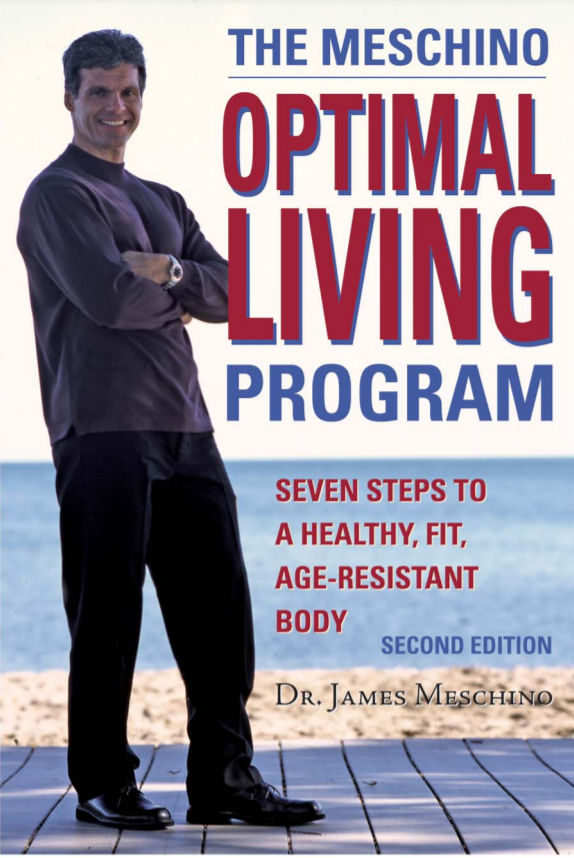
The Power of Mindful Eating
Today's Will Power Moment - 48
with Dr. James Meschino
Our topic today is the power of Mindful Eating. Most people agree that eating foods we like are a source of great pleasure. Pleasure is represented in the brain by the release of the “feel-good” chemical known as dopamine. Just the anticipation of most rewards, from food to sex, to shopping for something we desire, to playing a sport, to going to a concert, to achieving career success, is driven largely by the release of dopamine as we think about or anticipate these things. Dopamine drives us to seek the anticipated reward. If dopamine levels decline due to certain illnesses or from overuse of certain illicit drugs, then a person usually loses motivation and drive in many or all areas of their life. But for most of us, dopamine drives us to a large degree.
Now, for people who are prone to over-eating the dopamine rush can be a bit hazardous, as it can perpetuate overeating and binge eating behavior. However, there is a way to overcome this problem if you find yourself a victim of dopamine in this way. Here’s how it works. Let’s say you go to a movie and smell the popcorn, or you go to your favorite steak and chop house, or you smell the pastries and donuts out on the street as you walk by your favorite pastry shop, or you or someone else is preparing one of your favorite dishes for dinner.
Just the anticipation of consuming these items, coupled with the smell and appearance of the popcorn, coffee, donuts, pastry or your favorite food, can literally send your brain into “dopamine overdrive”. In a state of “dopamine overdrive,” the anticipation of pleasure in indulging in these foods can trigger a form of binge eating, or at least rapid food consumption whereby you are eating at such a quick pace that you’re barely evening tasting the food. This, of course, can lead to overeating, coupled with weight gain, elevated blood sugar, cholesterol etc. Let’s just say this type of dopamine-driven behavior gets a lot of people in trouble and blocks many people from losing excess weight or improving their health parameters.
But if look back at moments like this you’ll realize that eating the whole 8 or 12-ounce steak, or the big movie theater bag of popcorn, or the big serving of cake or pastry or ice cream, or, in my case, the gigantic bowl of pasta (although I have also been a victim of the big bag of movie theater popcorn on occasion), it doesn’t actually leave you feeling better. At some point, shortly after you rapidly consumed the whole serving size, you realize that you ate too much, you don’t feel well, you’re stuffed and lethargic, and you feel a bit ridiculous for not having had a little more self-control. The truth is that often the look and smell of the food you are driven to eat is better than the taste of the food after a certain volume of food has been consumed. The taste pleasure you derive usually starts to decline as more of the same is consumed.
But our dopamine centers trick us into keep going, convincing us that there is more reward to come if we keep eating. But there isn’t. More of a good thing often decreases the pleasure derived from the thing. Pacing out your pleasures in life provides more pleasure than constant pleasure indulgence, when you look at results from happiness surveys. The same is true for food. So, when binge eaters are asked to slow down the pace of their eating and concentrate on every mouthful and how their body is feeling, they start to recognize when they are becoming content and the taste of the food is no longer titillating their taste buds the same way. And this enables you to stop in advance of overeating or stuffing yourself into a state of physical and emotional regret. This is known as mindful eating.
Here are some ways to apply mindful eating in your everyday life:
If you eat popcorn at the movie theater, order the Kiddy Combo – a small, but sufficient, serving of popcorn. It usually comes with a small drink (make it sugar-free, even soda water), and give the candy or candy bar to someone else.
After eating the small serving of popcorn slowly I think you’ll realize like I did, that you don’t need the big popcorn bag.
At a pastry shop have the biscotti or a donut whole with your coffee if you need a treat.
Have the kiddie size ice gelato, low-fat frozen yogurt, or sorbet in a cup, if you drop into an ice cream shop.Order the smaller size of meat or fish on the menu. Have the chicken breast instead of the half chicken, or one chicken skewer instead of two.
Don’t eat all the rice, or potatoes, or bread that may come with the meal. Have some, but not all. Be mindful of how much you’re consuming relative to your actual level of hunger.
Same with pasta – it’s best served as a small side dish, not the main course if you’re going to have it.
In the end, realize before you start that your dopamine centers, once triggered by the anticipation of the reward (food in this case), will initially tell you that more is better. The truth is that “Less is More” when it comes pleasure, ongoing satisfaction, achieving a better -looking body, healthier blood chemistry and sense of self-control and self-esteem.
So, practice mindful eating: Start with a smaller serving size, eat more slowly, taste every mouthful, recognize when you feel content at which point more of the same doesn’t provide any more real pleasure. So, what’s the point of continuing, just stop at that point, recognizing that there will be other opportunities to eat in the near future, usually the same day. So, it’s not an all or none proposition.
Okay, recognize when your brain is going into “dopamine overdrive”. Catch yourself in the moment. Slow the action down and take a breath. Order the smaller serving size or the less damaging item, eat more slowly, concentrating on each mouthful. Recognize when you feel content at which point eating more is not really producing the same “hit” of intense taste bud pleasure. Stop at that point.
If any of this resonates with you, then mindful eating is an important way to overcome “dopamine overdrive” binge eating or overeating.
Eat Smart, Live Well, Look Great
Dr. James Meschino
DC,MS, ROHP

Dr. James Meschino
ABOUT THE AUTHOR
Dr. James Meschino, DC, MS, ROHP, is an educator, author, and researcher having lectured to thousands of healthcare professionals across North America. He holds a Master’s Degree in Science with specialties in human nutrition and biology and is recognized as an expert in the field of nutrition, anti-aging, fitness, and wellness as well as the author of numerous books.


